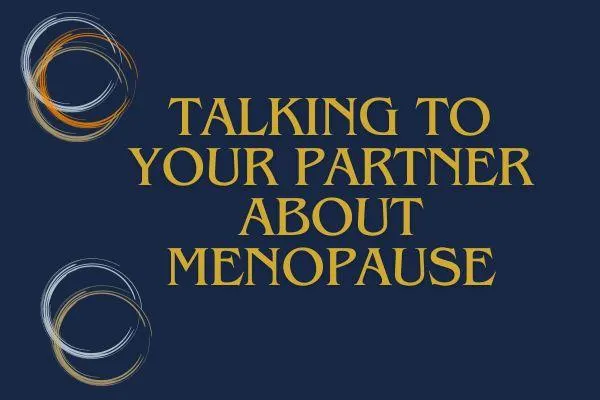Blog
Menopause Midlife & all the ****

Talking To Your Partner About Menopause
“What you believe can change your experience.”— Staness Jonekos
Introduction:
The menopause journey is undeniably a transformative life phase, both for you experiencing it and for those closest to you.

This page contains affiliate links. If you choose to purchase after clicking a link, I may receive a commission at no extra cost to you.
Understanding the Menopausal Journey
Menopause is more than a physical process; it's a profound emotional and hormonal shift. For us women going through this transformation, these changes can sometimes feel like a rollercoaster, and understanding them is the first step towards providing the support you need.
For the partner, it's crucial to educate yourself about the hormonal shifts, physical symptoms, and emotional changes that accompany menopause. This knowledge serves as the foundation for empathy and compassion, fostering an environment of understanding within any relationship.
Cultivating Empathy in Relationships
Empathy is the bridge that connects hearts, especially during challenging times. In the context of menopause, it's about recognising and resonating with the emotional landscape your partner is navigating. Acknowledge that menopause isn't just a checklist of symptoms; it's a unique experience for each woman.
As a partner, your role is not to "fix" things but to provide a safe and understanding space. A simple "How are you feeling today?" can open up avenues for meaningful conversations and connect you on a deeper level.
Active Listening Techniques
Active listening is an art that goes beyond hearing words. It involves tuning into the emotions and feelings behind the words. Active listening is an essential skill for both partners in a healthy supportive relationship. When your partner expresses her experiences, practice active listening by giving your full attention, nodding to show understanding, and validating her emotions.
Create an environment where both of you feel heard and respected. This not only strengthens your emotional bond but also encourages open communication, a cornerstone of any healthy relationship.
Expressing Needs and Desires
Menopausal women may find it challenging to articulate their needs and desires, often due to a mix of physical discomfort and emotional sensitivity. As a partner, it's essential to encourage and support this expression.
Encourage your partner to communicate her needs openly. This might involve establishing specific times for discussion, finding comfortable spaces for dialogue, or even introducing creative outlets like journaling to express thoughts.
Collaborative Solutions for a Harmonious Relationship
Menopause affects both partners, and navigating it together requires a collaborative approach. Discuss and explore solutions as a partnership, considering each other's perspectives and feelings. This might involve adjusting routines, seeking new ways to share responsibilities, or finding activities that bring joy and relaxation.
Approaching menopause as a shared journey fosters a sense of togetherness, making the process more manageable and strengthening the bonds of your relationship.
Building a Strong Support System
While partners play a crucial role, it's equally important for menopausal women to build a support system outside the relationship. This can include friends, family, or even participating in programs and communities designed to provide guidance and encouragement.
Encourage your partner to explore these avenues and remind her that seeking support is a sign of strength, not weakness. Together, you can create a network that reinforces her well-being during this transformative phase.
Join the Conversation
As we navigate the complexities of menopause together, I invite you to share your experiences and insights. Your stories may resonate with others, creating a sense of community and shared understanding.
Explore More
For a comprehensive menopause transformation journey, consider exploring our membership. It's a holistic approach that combines self-mastery techniques, including journaling, meditation, diet, exercise, and routines.
Conclusion
In conclusion, navigating menopause in a relationship requires patience, understanding, and open communication. As a partner, your role is not to fix everything but to stand beside and support your loved one through this transformative journey. By cultivating empathy, practicing active listening, and working together to find solutions, you can create a relationship that thrives amidst the changes.
Remember, the menopause journey is a shared experience. Let's embrace it together with grace, compassion, and the knowledge that, as a community, we are stronger.
Continuation of the Menopause Journey:
The menopause journey is a continuum. From perimenopause and on through into postmenopause, having people who understand and support you is essential. It's not the end of your life's journey; it's a phase, and having the right community can make all the difference.
I make it my mission to support women with their transition along the menopause journey.
If you would like to join a supportive community, please drop me a line here. I love hearing from midlife women going through the menopausal transition.
Pssst, you can also check out my Menopause Midlife and all the ****. It includes monthly strategies and a community of women at the same life stage as you.
Click here to get your Menopause Morning Rituals to make every day just that little bit easier.
Oh, and come say Hi on Facebook and join the free facebook group Menopause Midlife and all the **** here.
The Video for those of you who prefer
Check out other resources here:
How Menopause Affects Relationships
Your Menopause Self-Mastery Checklist:
Here is a quick checklist for you to think about when taking back control and getting back on track during your menopause transition.
Embrace self-care during menopause
Develop resilience through menopause
Goal-set to thrive through menopause
Join a supportive community Menopause Midlife and all the ****
Nurture healthy relationships during menopause
Leverage emotional intelligence for menopause well-being
Self-reflect and monitor personal growth throughout your menopausal transition.

What Everyone Ought to Know About Menopause in the Workplace
07 March 2022
Menopause affects 100% of women and can have devastating effects on them, their colleagues and their workplace. Does your HR department have a Menopause in the Workplace Policy in place?

Is Your Pension Future Proof?
14 March 2022
In today's financial uncertainty have you planned for your retirement? Could you create a passive income to increase your pension pot?

Menopause Tiredness All The Time
28 March 2022
Every day my inbox is flooded with questions about menopause. People want to know why menopause causes fatigue

The Cost-of-Living Crisis and What you can do to Thrive
04 April 2022
It’s all over the news and social media, there is a rapidly developing cost of living crisis. For many there already was and has been for some time.

5 Common Symptoms of Perimenopause and Understand How to Accept Them
11 April 2022
Let’s just make it clear; 100% of women will go through perimenopause and on into menopause. 99% of women going through ‘The Change’ will experience some symptoms that can affect daily life to some degree.

Can You Start an Online Business When You're Over 50?
18 April 2022
Like most of us I didn’t always have a flexible work regime and found myself working hours for a fixed income that didn’t quite meet the lifestyle I wanted to lead.
In fact, it was not all that long ago that I had to totally reassess what I was doing and where I wanted to be.

26 April 2022
Coping With Empty Nest Syndrome as a Single Parent
As if coping with midlife, erratic hormones and perimenopause was not enough, the children who you have spent the most significant part of your life nurturing and raising are ready to leave home and spread their wings.





